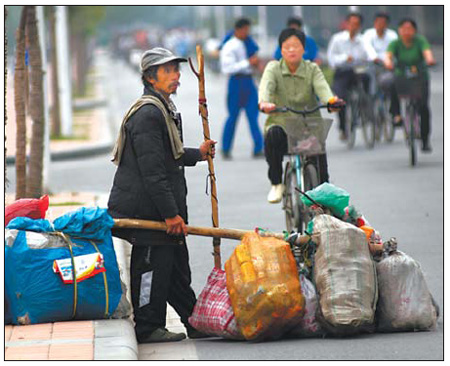Economy
Growing costs: Dilemmas, struggles facing China
By Hu Yinan, Li Jing and Wang Shanshan (China Daily)
Updated: 2010-01-22 07:49
 |
Large Medium Small |
|
 College graduates flood a job market in Lanzhou, capital of Gansu province, in the hope of winning one of the 4,000 positions on offer. The job market may be in recovery but unemployment also poses a real threat to the sustainability of China's economic growth, say experts. [Jiang Shenglian/China Daily] |
Manufacturing industries in coastal regions have started to pick up the pieces and the country is well on its way to becoming the world's largest exporter. But overseas demand for Chinese products is far from the pre-financial crisis levels and many people, especially among the nation's 225 million migrant workers, have struggled to find work.
|
||||
There is no official figure available to the exact number of people unemployed in China but the State Council has vowed to keep the registered unemployment rate below 4.6 percent this year - the highest since 1980.
A report published by the Chinese Academy of Social Sciences in late 2008 predicted registered unemployment could hit 10 percent last year. But through series of policy incentives and investment, the country limited the rate to 4.3 percent as of September, slightly higher than in 2008, said Yin Weimin, minister of Human Resources and Social Security.
China's export industry can no longer create the same number of jobs it did before the economic crisis, say analysts, and the country has been forced to find ways to boost domestic consumption.

A garbage collector takes a break in Nanjing, capital of Jiangsu province. The wealth gap in China is growing in "all directions", between urban and rural residents, between those in eastern and western parts, and between people working in different industries. [Lang Congliu/China Daily] |
Many of the migrant workers who were laid off last spring have already returned to the job market and eased concerns about a potential labor shortage, said Li Peilin, director of the academy's institute of sociology.
However, Niu Dao, a real estate expert with cnstock.com, insisted the situation could be more daunting than what labor officials say.
"Between January and October last year, power consumption by the light manufacturing industry experienced a year-on-year fall of 1.9 percent, according to figures from the National Energy Administration," said Niu. "That translated into a lack of contracts on the part of these enterprises and fairly accurately reflected the real employment conditions."
Most new loans made by Chinese banks last year went to the coal, power and transport sector, with the real economy not receiving much in comparison, Niu argued, citing figures released by the National Development and Reform Commission.
"At least 80 million migrant workers are employed in the light manufacturing industry. A drop in the industry's power consumption means people lose their jobs. I estimate around 31 million people were in fact jobless as of last October," he said.
The best solution in helping reduce massive unemployment is to stimulate the real economy and let products "made in China" benefit the Chinese, said Niu.
A scandal involving a university that faked a job contract for a student to push up its employment rate also knocked confidence in the country's job market. High employment rates for new graduates help promote colleges, but it has discovered some were manipulating their figures by making out contracts for jobs that did not exist. At the time, the government had placed jobless college graduates atop its agenda.








